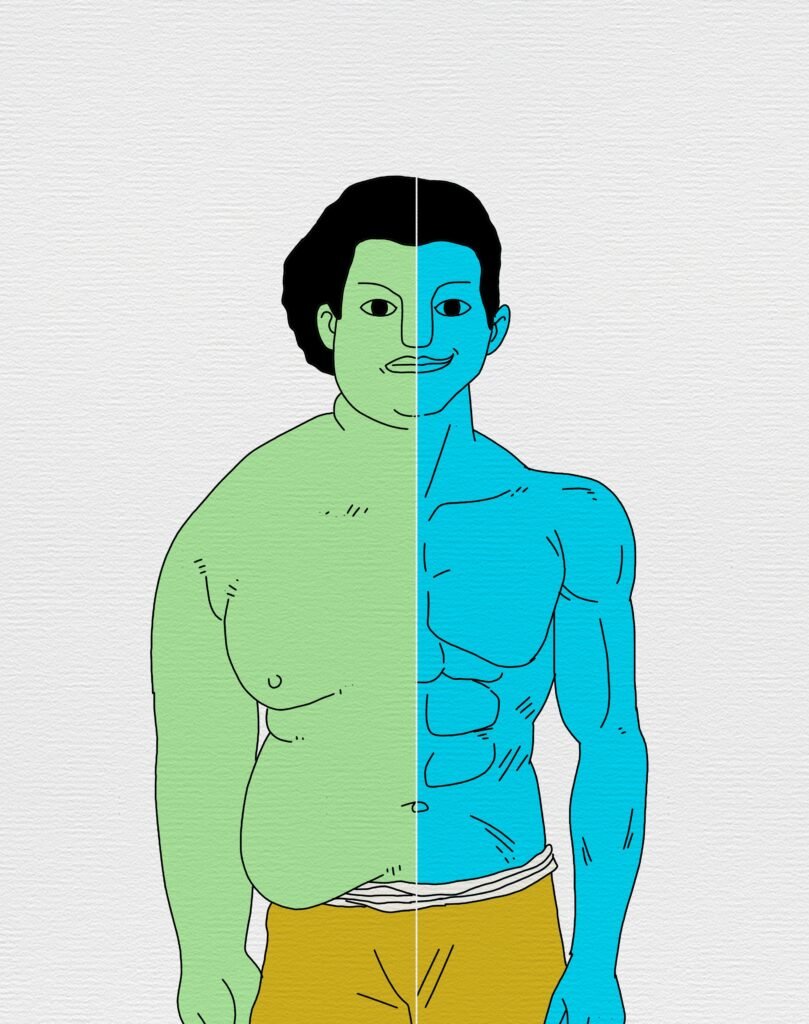Are you ready to shed those extra pounds and feel more energized? Losing body fat might seem like a daunting task, but with a smart and structured approach, it’s not only achievable but also rewarding. In this article, we’ll cover practical strategies, explore caffeine’s surprising role in weight loss, and share tips to help you become the healthiest version of yourself.
Why Does Body Fat Accumulate?
Fat accumulation is the result of consuming more calories than your body uses. While our bodies need calories for energy, any excess is stored as fat for future use. Over time, this leads to weight gain.
Fat loss, on the other hand, occurs when you create a calorie deficit—burning more calories than you consume. However, fat loss isn’t just about restricting food; it’s about making sustainable lifestyle changes that promote overall health.
Simple Strategies to Lose Body Fat Effectively
Focus on Nutrition: Fuel Your Body Right
Eating less doesn’t necessarily mean eating better. The key to fat loss is choosing foods that are nutrient-dense and satisfying.
Boost Protein Intake: Protein helps preserve muscle mass during weight loss and keeps you fuller for longer. High-protein foods, such as chicken, eggs, tofu, fish, and lentils, are essential for a fat-loss diet. Research shows that protein has a high thermic effect, meaning your body burns more calories digesting it compared to fats or carbs (American Journal of Clinical Nutrition, 2015).
Include Healthy Fats: Contrary to popular belief, not all fats are bad. Healthy fats found in avocados, nuts, seeds, and olive oil play a critical role in hormone regulation and overall health. They also help control appetite by keeping you satisfied longer (American Journal of Clinical Nutrition, 2000).
Prioritize Fiber: High-fiber foods such as whole grains, fruits, and vegetables slow digestion and stabilize blood sugar levels, preventing energy crashes and cravings. A high-fiber diet also supports a healthy gut microbiome, which is linked to better weight management (Nutrition Reviews, 2013).
Pro Tip: Incorporate a colorful variety of foods in your meals to ensure you’re getting a diverse range of nutrients.
Related Post: The Best Protein Sources for Quick Weight Loss
Move More: Exercise as Your Ally
Physical activity is a powerful tool in your fat-loss journey.
Cardio Workouts: Activities like brisk walking, cycling, or swimming are great for burning calories and improving cardiovascular health. Studies suggest that regular aerobic exercise significantly reduces body fat when combined with a calorie deficit (Sports Medicine, 2015).
Strength Training: Building muscle doesn’t just sculpt your body—it also increases your metabolism. Muscle tissue burns more calories than fat tissue, even at rest. Incorporate resistance exercises like weightlifting, squats, and push-ups into your routine (ACSM, 2012).
Quick Tip: Short on time? High-Intensity Interval Training (HIIT) combines cardio and strength training for maximum calorie burn in minimal time.
Related Post: Strength Training for Beginners
Prioritize Quality Sleep
Did you know poor sleep can sabotage your weight-loss efforts? When you don’t sleep enough, your body produces more ghrelin (the hunger hormone) and less leptin (the hormone that signals fullness). This hormonal imbalance can lead to overeating.
- Aim for 7–9 Hours: Studies show that adequate sleep improves fat loss and reduces cravings (Journal of Clinical Endocrinology & Metabolism, 2004).
Tip: Create a relaxing bedtime routine to improve sleep quality.
Related Post: How Sleep Impacts Your Weight Loss Journey
Hydration is Key
Drinking water isn’t just good for your overall health—it also plays a role in weight management.
Boosts Metabolism: Drinking water can temporarily increase metabolic rate and promote fat breakdown (Journal of Clinical Endocrinology & Metabolism, 2003).
Reduces Appetite: Staying hydrated helps prevent mistaking thirst for hunger, reducing unnecessary calorie intake.
Hydration Tip: Start your day with a glass of water and carry a bottle to sip throughout the day.
The Role of Caffeine in Fat Loss
Caffeine, found in coffee, tea, and many weight-loss supplements, is more than just a wake-up call.
Enhances Fat Burning: Caffeine stimulates the central nervous system, boosting metabolism and encouraging fat breakdown. It can increase calorie burning by up to 11% (American Journal of Clinical Nutrition, 1981).
Improves Workout Performance: A dose of caffeine before exercise can increase endurance, helping you burn more calories during your workout (Journal of Applied Physiology, 1995).
Reduces Appetite: Caffeine influences hunger-regulating hormones, helping you feel less hungry (International Journal of Obesity, 1989).
Caffeine: Use It Wisely
While caffeine offers benefits, overconsumption can lead to jitters, insomnia, or increased anxiety. The FDA recommends limiting intake to 400 mg per day (FDA, 2018). Listen to your body and adjust your intake if needed.
Conclusion
Losing body fat is a journey that requires patience, consistency, and a balanced approach. By adopting a nutrient-rich diet, staying active, prioritizing sleep, and hydrating well, you can achieve sustainable fat loss. Add caffeine as a strategic tool—used in moderation—and you’ll supercharge your results. Take small, manageable steps, and celebrate your progress along the way. You’ve got this!



